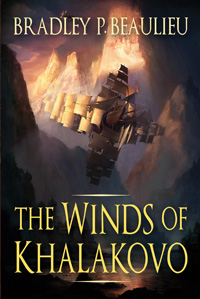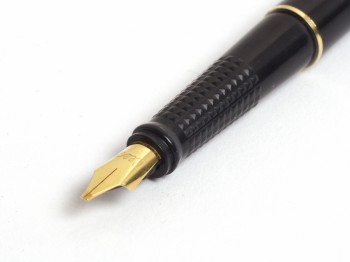Hook ’em and Don’t Let Go
 Selling novel-length fiction is tough. Really tough. Anyone who’s been in it for any length of time can tell you how competitive it is, how quickly the rejections can stack up, how frustrating it can be to get someone to even look at your manuscript. If you’re like me, you’ve tried submitting dozens of query letters in hopes that someone will at least ask for a few pages of the work itself. I mean, that’s fair, right — to at least look at the stuff before you reject it?
Selling novel-length fiction is tough. Really tough. Anyone who’s been in it for any length of time can tell you how competitive it is, how quickly the rejections can stack up, how frustrating it can be to get someone to even look at your manuscript. If you’re like me, you’ve tried submitting dozens of query letters in hopes that someone will at least ask for a few pages of the work itself. I mean, that’s fair, right — to at least look at the stuff before you reject it?
Trouble is, agents and editors receive many, many more queries than they can possibly accept. It’s not uncommon to find agents receiving 75 queries or more per day. Can you imagine trying to read partials from all of them? Impossible.
This brings to light the importance of the query letter. It is your knock at the door, your two seconds to say what you want before the door is closed with you still on the outside. So let’s take a closer look at the letter, this introduction of yourself and your work. It usually has three main sections: an opening which contains a hook, a brief description of the work, and your credits. The focus of this article is that first little section, where your hook will lie.
What is the hook? It’s usually a single sentence that sums up your entire work or (less commonly) gives some interesting bit of information about you. Just one sentence? Yes, just one. It is, by necessity, brief, and the reason should already be clear: agents do not have the time to read every word of everything they receive.
You may be tempted to belittle the importance, to gloss over it and move on to more important things, but let me warn you. Gina Panettieri, of the Talcott Notch Literary Agency, states, “The hook is extremely important. Agents and editors are astonishingly busy people and a great number of queries and cover letters are thrown at them daily. When pressed for time, it’s easiest for an overworked agent to try to make decisions based on reading as few words as possible.”
According to Ms. Panettieri, only about 10 percent of the hooks she reads are real grabbers. Another 20 percent catch her attention somehow, but are not overly compelling. And the final 70 percent? No zing. No pizzazz. And, needless to say, the chances of the agent not finishing your query letter, much less asking for a partial, increase the more your hook fails to impress. About 10 percent of the poor hooks “… are just so general, I walk away with no clear picture of the project.”
 Ok, hopefully by now you buy into the importance of the hook. Let’s move on to brass tacks. I’d like to mention a few things not to do before moving on to what you should. First, don’t waste your hook on trying to be funny. Too many people think they’re funny when they’re not, and on top of that, humor is very subjective. Heap on the fact that the agent may simply not be in the right mood for it, and it all adds up to a big no-no.
Ok, hopefully by now you buy into the importance of the hook. Let’s move on to brass tacks. I’d like to mention a few things not to do before moving on to what you should. First, don’t waste your hook on trying to be funny. Too many people think they’re funny when they’re not, and on top of that, humor is very subjective. Heap on the fact that the agent may simply not be in the right mood for it, and it all adds up to a big no-no.
Next, don’t open by saying your book is the next Harry Potter or The Lord of the Rings or that you’re the next Stephen King or Anne McCaffrey. Better to open with a strong hook and later in the letter compare your work to something more appropriate. Do your research and find books that are similar to yours in style and tone. You can than compare and contrast to bring out your novel’s strengths, and the agent will have a much better idea of where your book will stand in the market. And, to boot, their estimation of you as a businessperson will probably have been raised a notch or two in the process.
On a similar note, don’t proclaim your book as a sure-fire best seller. What a statement like this really tells the agent is that you have unrealistic expectations, don’t know the business, and may be hard to work with because of it.
Another ineffective (and, in my opinion, rude) technique cited by Ms. Panettieri is to quote glowing praise from another agent that has rejected your novel. Frankly, this is like handing your girlfriend roses that have tiny specks of dung sprinkled on the petals. The agent can’t exactly be enthused about a project that, by your own admission, has been rejected by someone else. It’s also clear that they weren’t first in line: another annoying bit of information the agent doesn’t need to know. Do they realize the novel might have been previously rejected? Yes. Do they know they might not have been the first agent you queried? Of course. But there’s no need to put it in your query, no matter how glowing the prior rejection might have been.
Ok, let’s move on to what you should do. You have a single sentence in which to describe your whole novel, right? Well, not really. What you’re trying to do is to create a buzz, to snag the reader’s attention, to give them that intangible that will make them want to continue reading.
 There are several choices to make when it comes to the hook’s content, but it comes down to stepping forward with your best foot. In other words, don’t wait until the end or even the middle of the query letter; don’t assume the agent will always read on to discover just how awesome your novel is. Open with your strong suit, right up front, and that will bolster the chance of them continuing to read, of continuing to become more compelled by your argument: that you have a piece of work ready for publication. Your best asset might be your expertise in the subject matter of the work, or it might be prior publications (and most times these are preferable), but for a great many of us, it’s some facet of the story itself that we’ll use, simply because we lack any other. Since the others are rather straightforward reporting, we’ll focus on bringing out that one nugget in your story for the remainder of the article.
There are several choices to make when it comes to the hook’s content, but it comes down to stepping forward with your best foot. In other words, don’t wait until the end or even the middle of the query letter; don’t assume the agent will always read on to discover just how awesome your novel is. Open with your strong suit, right up front, and that will bolster the chance of them continuing to read, of continuing to become more compelled by your argument: that you have a piece of work ready for publication. Your best asset might be your expertise in the subject matter of the work, or it might be prior publications (and most times these are preferable), but for a great many of us, it’s some facet of the story itself that we’ll use, simply because we lack any other. Since the others are rather straightforward reporting, we’ll focus on bringing out that one nugget in your story for the remainder of the article.
To do this, you must distill your story down to its very essence, making sure to bring out it’s uniqueness as you do so. I’ll illustrate with one of my own novels, simply because I have the hooks that progressed from, well, not-so-good to not-too-shabby. This novel was about a young painter who discovered a crystal that could read minds. I wrote a hook that had some merit, but it failed to focus on that one, unique aspect of the story that would snag the reader. In other words, I created a rather ho-hum hook:
A simple artist is thrown into the intrigues of an elite crime organization. The harder he tries to escape from his fate, the further he’s pulled in.
See what I mean? Not only that, I used two sentences to do it. The hook did manage to capture protagonist, antagonist, and the general struggle at hand, but it fails to impress. There’s nothing unique about this that the agent hasn’t seen a hundred times or more already. She might have even seen it a few times that day!
My next attempt was little better:
The story is about a Victorian-era artist who battles the forces of organized crime to save family and country.
The only thing that really changed here is that I alluded to the consequences, or the stakes of the plot. It’s a minor improvement, but it doesn’t quite get the juices flowing, does it? After this query letter had crashed and burned (by the way, up to this point I had received zero requests for partial mss after sending out roughly fifty queries) I attended a short seminar on writing the hook. I finally understood the hook’s primary goal is not to butter up the agent for the good stuff that’s to come, it’s to catch the agent’s attention, to give them a reason to read on. With this in mind, I gave it one more shot:
The story is about an ambitious artist who must defeat the forces of organized crime before they discover his secret of capturing thoughts in his paintings.

Now, this is no masterpiece, but the hook now contains the most unique facet of my novel: the fact that the protagonist can capture thoughts in paintings. This, I had to admit, was probably not something an agent would see every day. To test the waters, I sent a revised query with little else changed to several agents. I received four requests for partials in the span of a few weeks after querying 6 agents. Not a bad change, I decided.
Ok, so that’s my example, but it doesn’t do you much good since you don’t know much about my story and so aren’t able to understand how to create the hook. Let’s take another example, a movie this time: The Matrix. Let me suggest that you not read further than the movie title before you try to come up with your own hook. See if you can come up with a single line to encapsulate The Matrix, trying to bring out its most unique element(s).
What’s unique about it? Well, there’s the notion that the world is not real, that we’re actually all slaves to the matrix. What if we went with that? We’d want to bring Neo into the picture, somehow, and describe his realization of this fact and perhaps give hint to his subsequent struggles.
Neo — corporate clone by day, hacker in cyberspace by night — discovers that the world around him is a facade, that the real world is a place where all humans save a few rebels are enslaved, and he must now decide what to do about it.
Or perhaps you think Neo’s abilities in the matrix are the most unique element. In that case, perhaps we’d end up with something like this:
Neo begins a journey as a self-styled hacker in cyberspace, but as he discovers just how far his abilities in the matrix extend, it ends with him realizing he’s the key to saving humanity itself.
Remember, by the way, that you do not hide anything from the agent or editor. You want to lay all your cards on the table as soon as you can. The point here is to wow, not to play coy.
All right, one last go. Maybe you think that the matrix is really a story about love, about how it can overcome almost anything. We’d want to give some hint to the love story that blossoms between Neo and Trinity even among the grime of “reality”.
Neo never believed in true love, at least not until a mysterious woman named Trinity leads him to the other side of cyberspace.
Now, I’ll be the first to admit that I’m no poet, but I hope these examples illustrate how important the hook is to your chance of landing and agent or editor.
I would urge you to continue this hook exercise with other novels or movies. Try to create hooks for stories you know well. Try it right after finishing a book or seeing a movie. One source I can recommend is the Internet Movie Database (www.imdb.com). It doesn’t have hooks, per se, but it does have movie poster taglines for newer releases. These taglines, in many ways, are similar to the hooks in your query letters, and there are some interesting insights if you compare them to movies you’ve seen.
Now go dig into your story, find that one element that’s most unique or enigmatic or luminous and incorporate it into your hook.
Then hone it until it’s sharp enough to cut skin.
__________
This article originally appeared in The Broadsheet Magazine in 2005.
Bradley P. Beaulieu is the author of The Winds of Khalakovo, the first of an epic fantasy trilogy coming in April, 2011 from Night Shade Books. For more, please visit www.quillings.com.
Great post, thanks Bradley.
Thanks, Scott! I’m glad you enjoyed it.
Excellent advice!
Thanks, Howard!